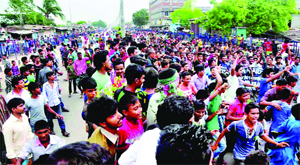Sadeq Khan
Sheikh Hasina’s listless “consensus government” appears to have lost all will to govern. New incidents of felonious mischief-making by her henchmen, holding representative authority by nomination under the January 5 voterless election process, are surfacing almost daily in the news. More and more “politicised” public servants are found to be murderously abetting and often themselves executing such acts of felony. From the mofussil dens of mafia dons, incidents of such planned felonies of the gravest kind are making news and terrorising civic life in the capital city itself.
On 19 June morning, a former Bangladesh Chhatra League president now a member of the ruling Awami Leagues working committee, was shot by a group of three unidentified motor-cyclists in Dhanmondi, Dhaka in broad daylight. The victim himself was riding a jeep on his way to Stamford University, a private institution of higher education of which he is a trustee. Online readers lost no time to quip: “Awami Leagers are killing Awami Leagers”; “reporters should dig out, it is another Milky killing (AL racketeer killed in a shopping mall).”
Gruesome Mirpur killing
On June 14, international television and news media reported how ten people “living in a squalid refugee camp” in the Mirpur area of the capital of Bangladesh died in an arson attack. One of them was shot by the police. The other nine, all of the same family and asleep in the small hours of the morning after “shab-e-barat” or “holy night of deliverance” vigil and prayers, were randomly picked by the attackers to be locked from outside in their home and torched to death. The purpose appears to be to create panic amongst the camp-dwellers. Most of the victims were women and children.
Police sought to pass off the incident as the result of violent clashes between locals and people living in the camp, known as “stranded Pakistanis,” following an altercation when a group of children set off firecrackers during the religious event in the evening before. But camp residents alleged that several hundred outsiders carrying machetes and lathis attacked the shanty town and set fire to their houses; firefighters were late to arrive to extinguish the flames, and the police did nothing to stop the attackers. On the contrary, when angry camp-dwellers gathered to protest, police opened fire and lobbed tear gas shells to disperse the mob, and detained more than 50 people at the scene, mostly from the camp-dwellers.
About 2,000 people were living in the camp when it came under attack. International media also reported that about 300,000 Urdu-speaking people live on government land in around 70 shanty towns, known as “Bihari camps.” During the partition of India in 1947, several hundred thousand Muslims, mostly from the Indian state of Bihar, came to what is now Bangladesh. After Bangladesh gained independence, Pakistan refused to repatriate most of the ‘Bihari’s or the “stranded Pakistanis” in refugee camps. In 2008, Bangladesh’s Supreme Court ruled that those who were born in Bihari camps after independence had the right to Bangladeshi citizenship.
Lucrative real state land
Representatives of the Stranded Pakistanis General Repatriation Committee (SPGRC) i.e. Bihari’s awaiting repatriation, have now met and submitted to the state minister for Home a list of people that allegedly had carried out the attack. The list includes local lawmaker and general secretary of Pallabi Thana Jubo League of the ruling party.
With no ownership deeds, the Bihari refugees are an easy target of land grabbers. They just have lists mentioning which person lives in which block of the camp. The land of the camp was given to them in 1972 as a temporary settlement for the “stranded Pakistani” refugees after the 1971 Liberation War.
Wedged in between Dhaka Cantonment and Pallabi and Kalshi of Mirpur, the large swath of land housing 1,734 families as per a 2008 census is a very lucrative real estate. Good communication network, connected to Begum Rokeya Sarani by main road, and to the Mirpur-Airport road flyover, makes the camp all the more attractive to the land grabbers. SPGRC leader said: “In 2008, a private real estate firm grabbed 27 plots of the camp. In 2009, our public relations secretary and I were called in by the commissioner of ward number 2. He tried to bribe us into giving him information about refugees who are very poor and can easily be persuaded to give up their land. Most of the people here are poor and illiterate. It is easy to threaten them and scare them into moving out.”
Investigative journalists of various dailies also found out and reported that the Mirpur-17 constituency lawmaker and his cohorts have allegedly let loose a reign of terror in Mirpur to occupy rivers, canals, playgrounds, lands of schools, roads and bazars. The lawmaker is maintaining a private force for this grabbing business and the members of this force also get shares with which some of them have become very rich overnight.
Alleged land grabbers involved
Under their possession are 474 plots of National Housing authority at Duaripara in Rupnagar Thana of Mirpur. The government failed to recover these plots even after launching several eviction drives. Zoo property of two acres of land worth Tk 200 crore has been grabbed by the lawmaker’s men. A part of Turag river used to flow behind the house of the MP. He has set up slums filling this portion of the river. Known as Molla Basti, it has 3,000 houses in the slum. Illegal water, power and gas lines are there. The slum dwellers pay for them.
There was a playground at Mirpur-12. That has been divided into plots and sold out also. Government officials, who are not a party to the loot, can do nothing to stop the land grabbers and their terror tactics, except to file suits for land recovery on which higher courts issue injunctions and ‘show cause’ notices in legal tangles that take decades to sort out.
In the ‘Bihari camp’ arson case and that of vandalism in a nearby mosque, the police is now reportedly busy filing false cases implicating some ‘bihari’s, i.e. the victims themselves, obtaining signature on blank paper from some unsuspecting locals as well as Bihari’s visiting the police station to report their troubles. Some of the complainants have told newsmen how their depositions have been used by the police to harass innocent persons that they never named and do not even know.
The mainstream opposition party BNP has strongly condemned the Bihari camp arson case as amounting to genocide and demanded ‘judicial inquiry’. Some smaller parties, erstwhile fellow-travellers of the ruling party have also remembered the High Court ruling over citizenship rights of those born in the refugee camps, and demonstrated in human chains upholding their rights. The road blocks and processions of the Bihari’s demanding justice, however, have been lathi-charged and dispersed by the police. However suspect in public eyes, the Mirpur lawmaker-godfather, like the law-maker-godfather in Narayanganj, continue to remain protected “above the law” by higher echelons of the administration, who no more care about what common people think or say.
Bizarre revelations in N’ganj
Meanwhile with the arrest of the fugitive main accused Nur Hossain in Calcutta, and the confessional statement by the arrested RAB-11 commanding officer to a judicial magistrate in the Narayanganj abduction and seven murder case, in which the god-father-lawmaker of that city has been publicly implicated, bizarre revelations are taking place. Newspapers have published stories how the god-father-lawmaker roped in Mr Hossain and engaged him to foil the-then Leader of the Opposition Khaleda Zia’s Long March programme in 1998, by blocking her motorcade at Sihiddhirganj. Agitating lawyers of Narayanganj bar are expressing fear and doubts that Nur Hossain may be manipulated to “fuzzy” the investigation, and demanding that he be brought back immediately.
Home Ministry officials told the parliamentary standing committee on the Home Ministry that Nur Hossain was facing trial in India for violating its laws. Unless the trial in India ends his extradition is likely to be delayed, but the Indian authorities could send Nur Hossain if the Foreign Ministry can negotiate the process well.
The 10-member standing committee recommended that the government should take all necessary measures to bring back Nur Hossain to face trial. But the Establishment of enquiry commission which had earlier reported to the High Court that the commission found no evidence of RAB involvement in the N’ganj seven murder case have expressed their intention to question Nur Hossain in Indian custody, if he cannot be brought back before their next date of reporting progress to court.
Two RAB officials who had earlier confessed of their involvement in the abduction and murder in their duty “to obey a high official’s order” have now been corroborated by the confessional statement of the RAB-11 commanding officer. All three said that RAB Additional Director General Col Ziaul Ahsan had been involved and had ordered the abduction and murders. People in Narayanganj and elsewhere are wondering why the law is so slow in moving against such highly placed suspects.
HC rejects legitimacy challenge
Meanwhile the High Court has disposed of the challenge to the “legitimacy” of the 10th parliament questioning the constitutional validity of Article 19 of the Representation of the People Order (RPO) by exercise of which the Election Commission declared 153 out of 300 candidates elected uncontested in the January 5 general elections without a single vote being cast, and without allowing the voters even the option of a “no vote” to reject the nominated candidate.
The court declared legal a provision of the Representation of the People Order (RPO) that allows the Election Commission to announce contenders in the parliamentary polls elected uncontested without voting, and also said it cannot ask parliament to incorporate any rule regarding the “no vote” option in ballots during the election.
But can the win in the court wipe off the stigma of criminality and the mafia character of the essentially “unelected” parliament members who naturally consider themselves unaccountable and above the law?
Source: Weekly Holiday










